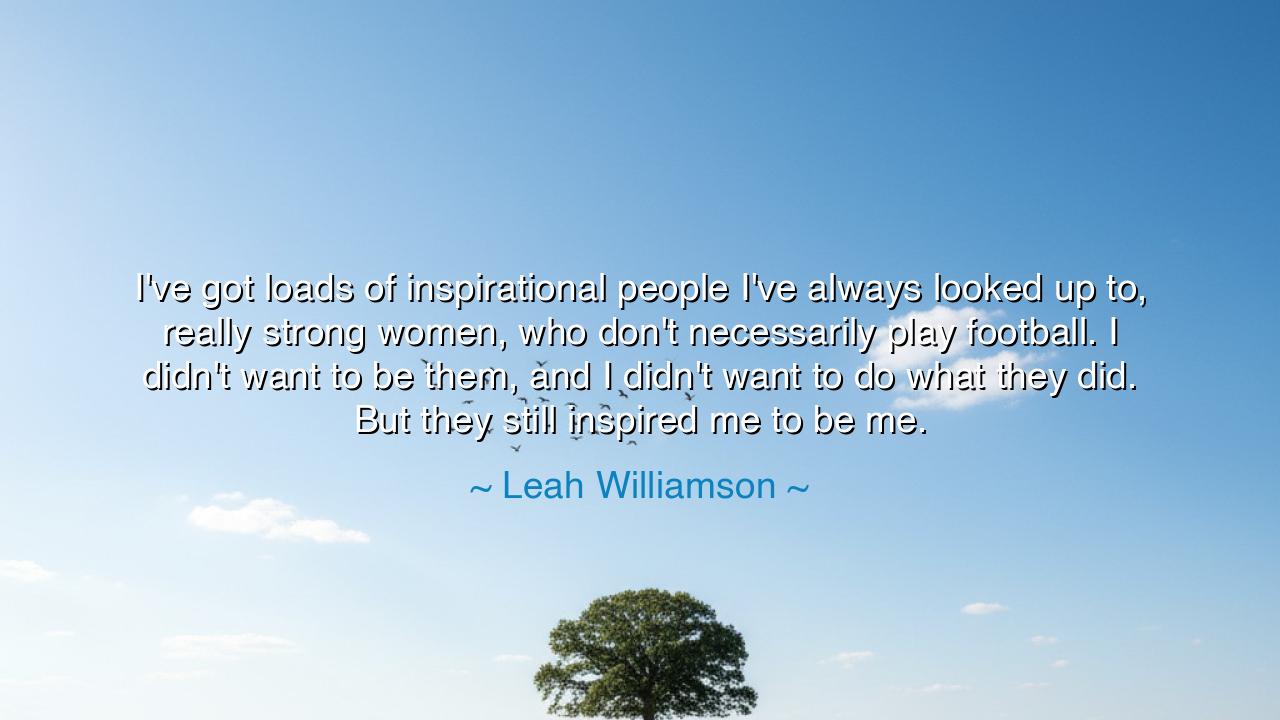
I've got loads of inspirational people I've always looked up to
I've got loads of inspirational people I've always looked up to, really strong women, who don't necessarily play football. I didn't want to be them, and I didn't want to do what they did. But they still inspired me to be me.






In the words of Leah Williamson, captain, leader, and daughter of perseverance, we find a reflection of timeless truth: “I’ve got loads of inspirational people I’ve always looked up to, really strong women, who don’t necessarily play football. I didn’t want to be them, and I didn’t want to do what they did. But they still inspired me to be me.” These words, though humble, carry the wisdom of the ancients — that true inspiration does not demand imitation. It awakens what already sleeps within. It does not mold us into another’s likeness, but rather reminds us of our own divine shape.
Leah Williamson, born of grit and grace, speaks here not only of sport, but of identity — of the eternal struggle to become one’s truest self. As captain of England’s national football team, she stands as a symbol of strength and humility, yet her insight reaches beyond the field. For she reminds us that the greatest teachers are not those who make disciples, but those who set others free. The inspirational people who shaped her — the “strong women” she names — did not press their will upon her; they showed her what was possible. And in witnessing their courage, she found her own.
This understanding has its roots in the wisdom of the ancients. The philosopher Aristotle taught that the purpose of education is not to fill the mind, but to guide the soul toward virtue — to help a person become not a reflection of the teacher, but the best version of themselves. In the same way, Williamson honors her role models not by copying their paths, but by walking her own with courage. Her words echo that eternal law of inspiration: that greatness is not inherited, but ignited. The flame of another’s strength becomes the spark that awakens our own.
Consider, for a moment, the story of Joan of Arc, the young woman who led armies through faith and fire. She, too, looked to the saints and heroines of her time for guidance, yet she did not seek to become them. Their bravery taught her that she, too, could hear the voice of destiny. And when her moment came, she did not mimic their deeds — she forged her own legend. Like Williamson, Joan was inspired to be herself — to act not in imitation, but in authenticity. For the truest form of admiration is not replication, but transformation.
Williamson’s reflection also holds a subtle defiance — a rejection of the world’s narrow expectations. Too often, society teaches that to admire another is to follow their exact path. Yet her words remind us that admiration need not erase individuality. She looked up to women outside her craft — mothers, leaders, creators — not because she wished to walk their roads, but because they showed her how to walk hers with dignity and conviction. They taught her that strength is not confined to a single form. A queen, a teacher, a doctor, or a footballer — each, in her own way, is a vessel of power.
What is most powerful in her declaration — “they inspired me to be me” — is its quiet simplicity. It speaks of liberation, the kind that comes when we stop seeking to become someone else and instead dare to become ourselves. The ancients called this state eudaimonia — the flourishing of the soul, the harmony between what one does and what one truly is. Williamson, through her humility, gives voice to that truth. The purpose of role models is not to create echoes, but to awaken voices. To see greatness in another is not to bow before it, but to recognize that it reflects what is possible within you.
So, dear listener, take this teaching into your heart: admire freely, but live authentically. Let the strength of others inspire, but not define you. Seek those whose lives awaken your courage, your kindness, your sense of purpose — not to copy them, but to remember who you already are. As Leah Williamson teaches, the highest form of inspiration is the kind that returns you to yourself.
And when you, in turn, live bravely and truthfully, you too will become such a light — not one that demands others to follow your path, but one that helps them see their own. For the truest gift of an inspirational person is not to make others more like them, but to make others more like themselves. Thus, live in such a way that your courage sets others free — and through that freedom, let the world come to know the beauty of authenticity, the power of individuality, and the quiet greatness of simply being you.






AAdministratorAdministrator
Welcome, honored guests. Please leave a comment, we will respond soon